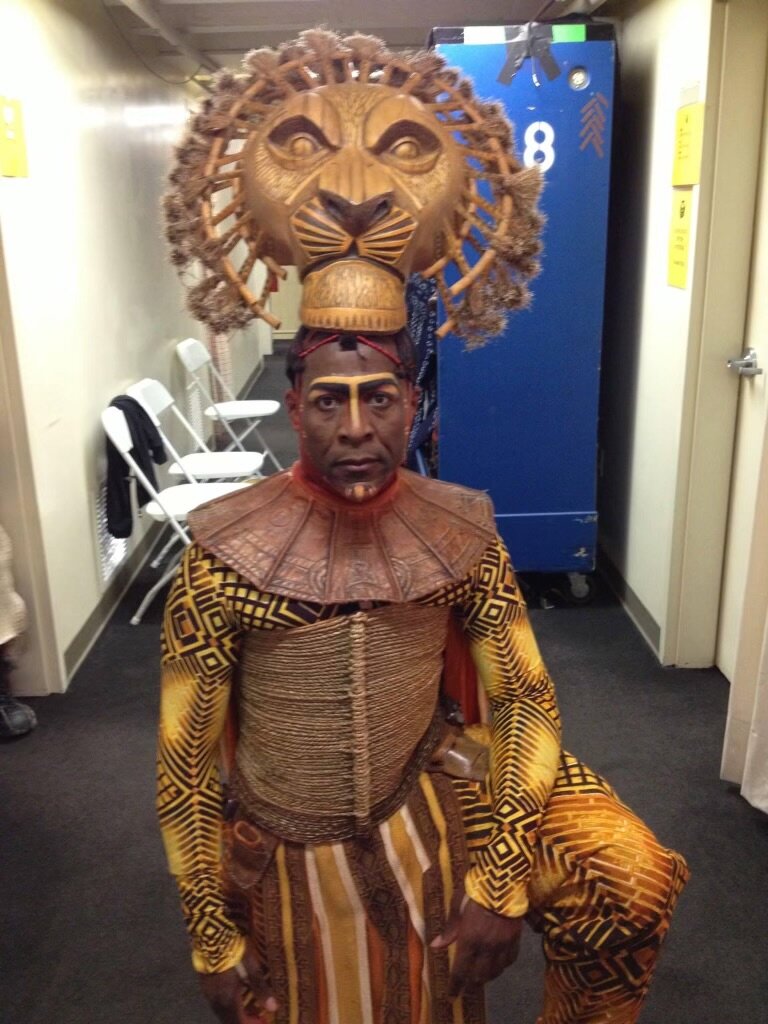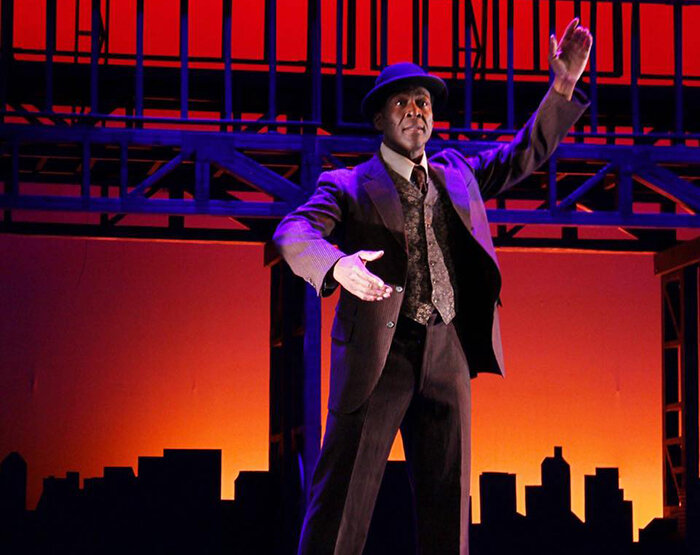From Augusta to Broadway to Long Beach: Russell Joel Brown's inspiring journey
Russell Joel Brown has had an enviable career as an actor, appearing on Broadway hundreds of times, and becoming a millionaire along the way.
Brown’s journey has been a unique one, with no shortage of ups and downs. All he has done and all has been through so far, he said, has led him to Long Beach, where he moved in January.
Brown, 60, grew up in Augusta, Georgia, the youngest of seven children. His parents sent two of his siblings to an Episcopal school in 1965, and they were its first Black students. The public schools in Augusta weren’t integrated until 1971.
Brown considers that time very important in his own development, because, he said, “We were a black family growing up in the segregated South there, and this major event has happened for a family with support from the school, and from our church, and from the Black community as well as some people in the white community.”
His sister Karen was a talented ballet dancer, and dance interested Russell as well. Her teacher, the late Ron Colton, had danced with the New York City Ballet, alongside Arthur Mitchell, the first Black dancer in the company. When Colton persuaded Mitchell to come to Augusta to see Karen dance, Mitchell was impressed, and brought her to Manhattan to perform after she graduated from high school in 1973. She danced with the city ballet for 22 years.
When Russell’s parents took him to see her debut at the Loew’s Victoria Theatre in Harlem in 1973, he came home having decided that that was what he wanted to do with his life. So he enrolled in the Augusta Ballet School, and studied there for eight and a half years. He danced with different companies each summer, and he got some feedback from one instructor that changed the trajectory of his life.
“They said, ‘He’s a wonderful person, he’s tall, he has great leaps, he has great extension,’” Brown recounted. “‘But if he’s serious about being a ballet dancer, he’s going to have to do something about those feet, because they don’t point.’ I desperately wanted to be a ballet dancer, so I asked what it would take, and they said I’d have to have my feet broken and reset. I decided it (wasn’t) that important to me.
“Luckily, I had this beautiful voice,” he added. “I had been in choirs all along, and so it was easy for me to transfer from ballet over to the theater.”
Brown gave up ballet in his senior year of high school. He was an excellent student, and was offered a full scholarship by Morehouse College, in Atlanta, to study engineering.
His first week there, he auditioned for, and was accepted in, the Morehouse Glee Club. Then, about three months into his freshman year, he realized he didn’t want to be an engineer anymore. His grades were slipping, and he lost his scholarship.
The Glee Club offered Brown a scholarship, but he was told that he needed to choose between engineering and singing. He chose singing.
He graduated in 1988 with a degree in psychology, and worked for a few years for Hyatt Hotels, starting as a cashier and working his way up to a management position. But Brown wanted to perform, so he asked to be moved to a hotel in New York so he could become an actor. He was transferred to the Grand Hyatt Hotel at Grand Central Station in 1990, where he worked the graveyard shift as a doorman.
For about three years, as a member of the Actors Equity Association, he performed in small shows, making about $225 a week and $30 per diem, while auditioning unsuccessfully for bigger productions.
In 1994, Brown got a job with Royal Caribbean, and performed in two shows a night for six months on cruise ships. Back in New York, he got a job at the Motown Café, on 57th Street. Then, in 1996, he got his first Broadway contract, to perform in “Smokey Joe’s Café.” He was a standby for one of the stars, and sang in a background quartet when the show toured a number of cities in the U.S., as well as Japan.
In 1997, he began going to casting calls, known as “cattle calls,” for “The Lion King,” at which the play’s producers were mostly looking for chorus performers. Two years later he was asked to take a class in African dialect, and then, in 2000, Brown was called in to audition for the key roles of Mufasa, Simba and Scar. But nothing came of it.
He performed in “The Scarlet Pimpernel” for a year and a half, before going home to Augusta in the summer of 2001, when his father fell ill, and eventually died. Brown stayed in Georgia for four years, until, in August 2005, he got a call from the producers of “The Lion King” to be an immediate replacement on its West Coast Cheetah Tour.
“They called and said, ‘We have to see Russell tomorrow for an immediate replacement on the tour,’” he recalled. “I told them I can’t be there tomorrow. I live in Georgia, and I also can’t afford to fly to New York on a last-minute ticket.” So his agent paid his way.
The producers asked Brown to dance, sing and read, and less than two hours later, they called and offered him a role in the chorus and as the understudy for Mufasa and Scar. Over the course of eight years, he had auditioned no fewer than 15 times for the show. Over the next 12 years he would perform in four different companies of “The Lion King,” and make over a million dollars. He took the stage as Scar about 30 times, and as Mufasa about 350 times.
Brown still remembers how he felt the first time he took the stage, with the Cheetah Tour company in Portland, Oregon.
“I was as nervous as nervous could be,” he said. “Everything that happens in a long-running show like that is very specific — it’s not open to your interpretation. Yes, you’re bringing your heart, but there are specific things that you’re supposed to do.”
Brown retired from the stage in August 2017, at the end of the Gazelle Tour, “The Lion King’s” only remaining domestic tour.
“I came to New York to get to Broadway, and I made it to Broadway,” he said. “I’ve been in the biggest money-loser in Broadway history at that time, which was ‘The Scarlet Pimpernel,’ and I’ve been in the biggest money-maker in Broadway history, ‘The Lion King.’ There was nothing else to achieve, so I left New York and I went home to Augusta, and I took a job teaching at a brand new charter school.”
He taught at the School for Arts-Infused Learning, at which the arts were part of the core curriculum, for a year and a half before starting a program called Boys with a Future. There he helped underprivileged children learn to read and enhance their educational skills.
Then, earlier this year, Brown wanted to come back to New York. His best friend lives in Long Beach, so he joined him here. He is still getting to know the community, but is enjoying it, and he hopes to land a gig singing in a church, and to work again in theater — this time behind the scenes.

 80.0°,
Partly Cloudy
80.0°,
Partly Cloudy 







